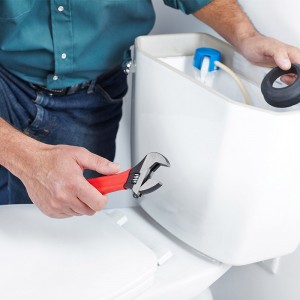Updated November 2017
Clogged toilets can be repaired easily with the right tools and knowledge. However, figuring out how to fix a clogged toilet often requires a little trial and error. Usually low water pressure is the real cause of a toilet clog. This means that common chemical solutions to unclog sink and shower drains won’t work. These products are not only ineffective, but may damage the porcelain in your toilet.
Instead, try adding a gallon of water to your bowl and flushing again. This added water pressure is often enough to force a flush. Like most people around Portland, we want to use eco-friendly solutions. Don’t you love it when the easiest solution is also the cheapest and cleanest?
Tips for fixing a clogged toilet
If adding a gallon of water doesn’t work, try adding simple dish detergent before grabbing the plunger. Work the plunger directly down into the trap, creating the tightest seal possible. You may have to do this several times before it takes hold. Don’t give up after the first few times; you may be loosening the clog and not even realize it.
How to fix a clogged toilet requires a lot of trial and error. If detergent fails to clear the clog, grab the rubber gloves and a bucket for some serious DIY plumbing. You will need to extend the handle of the auger (snake) and put it right into the toilet trap in order to effectively clear this clog. Most new augers have sheaths to protect from scraping and scratching. Snaking a toilet is one of the first techniques we would use to clear your clog, so trying it yourself can be very effective.
Once you feel some resistance, you’ve found the toilet clog. Rotate the snake by cranking the handle, simultaneously pushing to break the clog up (or “grab it” with the cable end). Extend the handle one more time before retracting. Have the bucket nearby to collect any refuse that may come out with the auger.
How to fix a clogged toilet: When to call a plumber
Make sure the water completely drains out of the toilet like a normal flush. This is the sign that the clog is gone and everything is flushed. You can opt to put the bucket contents back in the toilet in small doses.
If at first you don’t succeed with the auger, try, try again. Knowing how to fix a clogged toilet sometimes requires a professional plumber. If after a few attempts you’re still not successful, it’s time to call Meticulous Plumbing. Our highly trained staff is more than happy to help.
To help avoid major toilet clogs in the future, there are certain items that you should never flush down your toilet, or you will likely require a quality plumber to set things right again.
7 Things you should never flush down your toilet
1) Dental floss: Floss is a non-biodegradable item and should be thrown in the trash, not down the toilet. If you make a habit of flushing floss down your toilet, you may be in for a tangled situation—floss will catch on rough sewer pipes, intertwining with itself and other items, leading to clogs.
2) Sanitary items: Personal sanitary items such as tampons, sanitary napkins, and disposable wipes are some of the worst items you can flush. The cotton in these items will snag on your pipes—especially if your pipes have cracks or root damage—and create major clogs. Additionally, cotton doesn’t break down easily in water, which can spell serious trouble for your septic system over time.
3) Food fat: You’ve likely heard that you shouldn’t pour grease down your kitchen sink. The same goes for your toilet. While grease, oil, and fats may pour as a liquid, they harden as they cool and will stick to the sides of your pipes. Eventually, the passage will become increasingly small, resulting in a potentially damaging clog.
4) Diapers: For many readers, this will seem like a no-brainer, but it is essential that you do not flush diapers down your toilet. Diapers are designed to expand in liquid—it would be akin to flushing a very large sponge down your toilet. Flushing diapers will almost assuredly lead to blockage, so simply dispose of them in the trash.
5) Bandages: Adhesive bandages not only cause annoying clogs in your pipes, but they are also made from non-biodegradable plastic, which is detrimental to the environment.
6) Hair: As with floss, hair can easily catch on cracks and rough pipes and then act as a sort of net to catch other waste and create pipe blockage.
7) Paint, solvents, and thinners: It can be tempting to get rid of hazardous liquids by flushing them down the toilet, but you’re doing more damage to your sewer pipes than you may realize. Caustic chemicals in solvents and thinners can eat away at your pipes, weakening them and potentially causing a very expensive repipe job. If that weren’t reason enough, the viscous nature of paint can settle in pipe bends and contribute to clogs made of hair, floss, fat, and anything else that should simply be thrown away in the trash.
Bathroom plumbing services in Portland OR
Meticulous Plumbing is Portland’s hometown plumbers, and we’re ready to get you out of any tight plumbing spot. We’re the experts in an array of bathroom services, from knowing how to fix a clogged toilet to bathroom remodels and more.


